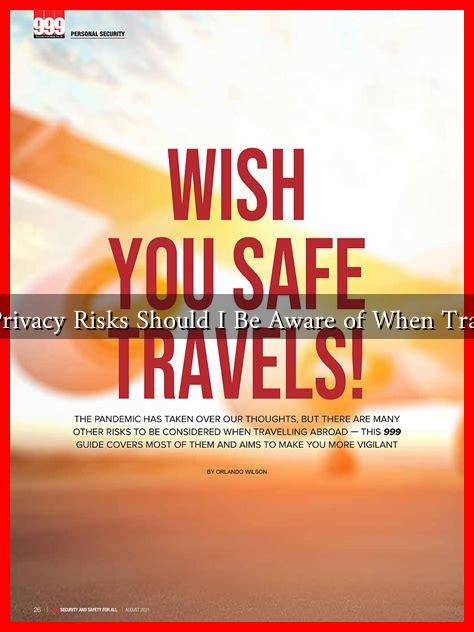-
Table of Contents
What Privacy Risks Should I Be Aware of When Traveling?
Traveling can be an exhilarating experience, but it also comes with its own set of privacy risks. As we navigate through airports, hotels, and public spaces, our personal information can be exposed to various threats. Understanding these risks is crucial for protecting your privacy while on the go. In this article, we will explore the most significant privacy risks travelers face and provide actionable tips to mitigate them.
1. Public Wi-Fi Vulnerabilities
One of the most common privacy risks when traveling is the use of public Wi-Fi networks. While convenient, these networks are often unsecured, making it easy for hackers to intercept your data.
- Data Interception: Cybercriminals can use tools to capture data transmitted over public Wi-Fi, including passwords and personal information.
- Man-in-the-Middle Attacks: Attackers can position themselves between you and the network, allowing them to monitor and manipulate your online activities.
According to a report by Norton, 70% of people have connected to public Wi-Fi without a password, exposing themselves to potential threats. To protect yourself, consider using a Virtual Private Network (VPN) to encrypt your internet connection.
2. Location Tracking
Smartphones and other devices often come with built-in GPS capabilities, which can be a double-edged sword. While location tracking can help you navigate unfamiliar places, it also poses privacy risks.
- Unintentional Sharing: Many apps request access to your location, which can be shared with third parties without your knowledge.
- Stalking Risks: Sharing your location on social media can alert potential stalkers to your whereabouts.
To mitigate these risks, regularly review the location settings on your devices and limit location sharing to essential apps only. Additionally, consider disabling location services when not in use.
3. Data Breaches at Hotels and Airports
Hotels and airports are prime targets for cybercriminals due to the vast amount of personal data they handle. Data breaches can expose sensitive information, including credit card details and identification.
- Hotel Data Breaches: In 2018, Marriott International reported a data breach affecting approximately 500 million guests, highlighting the vulnerabilities in hotel data security.
- Airport Security Risks: Airports often store passenger data for security purposes, making them attractive targets for hackers.
When booking accommodations, research the hotel’s data security practices and consider using a credit card with fraud protection features. Additionally, avoid providing unnecessary personal information during check-in.
4. Social Media Oversharing
While sharing travel experiences on social media can be fun, it can also expose you to privacy risks. Oversharing can lead to identity theft or unwanted attention.
- Identity Theft: Posting personal details, such as your travel itinerary, can make you vulnerable to identity theft.
- Home Security Risks: Announcing your absence from home can alert burglars to target your property.
To protect your privacy, consider waiting until you return home to share travel photos and updates. Use privacy settings to control who can see your posts.
5. Phishing Scams
Travelers are often targeted by phishing scams, where attackers impersonate legitimate organizations to steal personal information.
- Email Scams: You may receive emails that appear to be from airlines or hotels, asking for sensitive information.
- Fake Websites: Scammers may create fake websites that mimic legitimate travel services to capture your data.
Always verify the authenticity of emails and websites before providing any personal information. Look for signs of phishing, such as poor grammar or suspicious links.
Conclusion
Traveling can expose you to various privacy risks, from unsecured public Wi-Fi to data breaches and phishing scams. By being aware of these risks and taking proactive measures, you can protect your personal information while enjoying your travels. Remember to use a VPN, limit location sharing, research accommodations, be cautious on social media, and verify communications. With these strategies in place, you can travel with greater peace of mind.
For more information on protecting your privacy while traveling, consider visiting Privacy Rights Clearinghouse.


